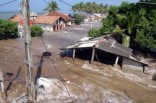 有的事情難以形容,難以置信,難以忘記。2004年12月26日的海嘯就是這種大事。亞洲十一個國家的二十一萬多人失蹤死亡。根據聯合國衛生組,數百萬人受傷,兩千萬人失去家園。
有的事情難以形容,難以置信,難以忘記。2004年12月26日的海嘯就是這種大事。亞洲十一個國家的二十一萬多人失蹤死亡。根據聯合國衛生組,數百萬人受傷,兩千萬人失去家園。
2011年,在日本,就如在其他時候在其他地方,天然災難都不可磨滅的燒入我們的記憶。
身為基督徒的我,在面對這樣悲劇時,我會閱讀《聖經》,從中獲得安慰和希望。請讓我跟您分享《聖經》里的幾句話,描述神為我們的避難所和我們慈愛的父親。神願意安慰那些親近他的人。
古代一個王國的國王名叫大衛。大衛面臨一些想要廢黜他的共謀者。大衛傾吐衷情地向神祈禱說,“神阿,除了您以外,我沒有任何依靠”。請聽大衛自己的話:“我的心默默無聲,專等候神。我的救恩是從他而來。惟獨他是我的磐石,我的拯救。他是我的高台。我必不很動搖” (詩篇62:1-2)。面對災難和壓力時,神也是我們獨一無二的依靠和拯救。
 大衛開始做王以後,他曾經言簡意賅地描述了他的信仰;他說:“我懼怕的時候要倚靠你”(詩篇56:3)。
大衛開始做王以後,他曾經言簡意賅地描述了他的信仰;他說:“我懼怕的時候要倚靠你”(詩篇56:3)。
其他古人面對生命上巨大的問題時,他們思念神和他的慈愛,從中獲得了力量,使得他們能夠繼續生存。有一位作者說,“神阿,我的心切慕你,如鹿切慕溪水。我的心渴想神,就是永生神。我幾時得朝見神呢。”作者也表示他的痛苦;他說,“我晝夜以眼淚當飲食”。之後,他宣稱他的信仰說,“白晝耶和華必向我施慈愛。黑夜我要歌頌禱告賜我生命的神”。作者質問自己,“我的心哪,你為何憂悶,為何在我裡面煩躁”。古代的詩人憑着信仰回答自己的問題:“應當仰望神… 因[為]… 我還要稱讚他”(詩篇42:1, 2, 8, 11)。
在海嘯或任何災難之後的黑夜,我們都要向神祈禱,告訴他,我們的飲食就是眼淚,我們的未來非常不肯定。同時,我們要在神的面前低頭,謙卑的祈求神幫助我們。如鹿切慕溪水一樣,我們要仰望神。我們要宣布自己的信仰說,我還要稱讚他,我的救主,我的神。
我盼望我們,跟其他很多基督徒一樣,都要說,“神是我們的避難所,是我們的力量,是我們在患難中隨時的幫助。所以…我們也不害怕”(詩篇46:1-2)。
我請您尋找真神,就是那位在《聖經》里所彰顯出來的神。請閱讀《聖經》,思考《聖經》詩篇的記載。請聽聽大衛王傾吐衷情地向神祈禱。請尋求認識那位既慈愛的神,親自看見他如何的愛您。
Some events burn themselves into our consciousness; the tsunami of December 26, 2004, was one such event. At least 210,000 people in 11 countries were killed in the disaster. Thousands were injured, and more than two million people were displaced, according to the World Health Organization.
Again in 2011 (in Japan) and at other times as well in other places, earthquakes, tsunamis and other natural disasters burn themselves indelibly into our memories.
As a Christian, I turn to the Bible to find words of comfort and hope in the face of such tragedy. May I share with you several quotations from the Bible that point to God as our refuge and as a loving father who seeks to comfort those who will draw near to him.
David, the king of an ancient kingdom, faced conspirators who wanted to dethrone him. David poured out his heart to God and said, “I don’t have anyone but you, God!” David said, My soul finds rest in God alone; my salvation comes from him. He alone is my rock and my salvation; he is my fortress, I will never be shaken [Ps 62:1‑2]. In times of disaster and stress, we too can find rest and salvation in God alone.
Earlier in his career, this same David expressed his faith very simply; he said, When I am afraid, I will trust in you [Psalm 56:3 NIV].
When other ancients faced the overwhelming problems of life they meditated on God and his love and found in God the strength to carry on. One person wrote: As the deer pants for streams of water, so my soul pants for you, O God. When can I go and meet with God? We see his distress in the statement, My tears have been my food day and night… Then he affirms his faith: By day the Lord directs his love, at night his song is with me… The author asks himself, Why are you downcast, O my soul? Why so disturbed within me? And he answers his own question with a statement of faith: Put your hope in God, for I will yet praise him, my Savior and my God (Psalms 42:1, 2, 8, 11).
In the dark hours following a tsunami or other disaster, we too can pray to God and admit that our tears are our food and that our future seems so uncertain. But then we too bow our heads and humbly ask God to help us. Let us long for God just as the dear pants for the streams of water. And let us express our own statement of faith and say “I will yet praise him, my Savior and my God.”
Let us say, along with so many other Christian believers, God is our refuge and strength, an ever‑present help in trouble. Therefore we will not fear… (Psalm 46:1‑2).
I invite you today to seek the God who is revealed in the Bible. Obtain a copy of the Bible and read it. Meditate on the Psalms where King David and others pour out their hearts to God. Come face-to-face with the God who is love and who loves you.
【天災】四:生還者的力量——神的話
Natural Disasters (4): Strength for Survivors: The Word of God
作者:謝德華 ©By Edward Short
World Christian Broadcasting
